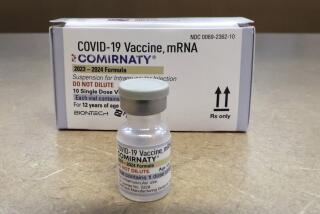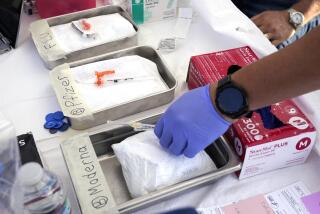Panel to Call for Triple-Drug Therapy for HIV
- Share via
WASHINGTON — Federal health officials are expected to recommend today that most HIV-infected patients be treated early and aggressively with potent triple-drug combinations that include a protease inhibitor, a regimen that is not always currently practiced among clinicians nationwide.
The government guidelines were written in an attempt to reduce the confusion among doctors--many of whom are not AIDS specialists--over when and how to prescribe these antiviral drugs, which thus far have dramatically improved the health of many HIV-infected individuals.
The report also is expected to bolster efforts to close existing gaps in coverage of these expensive treatment regimens by private insurers and federal and state health assistance programs. The coverage gaps have made such treatment inaccessible to many individuals with HIV.
The cost of the drugs--about $15,000 a year--is not reimbursed by many states and is not always routinely covered by private insurance, particularly when the use begins in early treatment stages.
AIDS activists have called for the expansion of Medicaid eligibility to people in early, asymptomatic stages of infection, and for additional funds for the Ryan White Care Act, which supports numerous AIDS treatment programs.
The coverage gap “directly threatens thousands of people with AIDS across the country,” said Daniel Zingale, executive director of AIDS Action Council, a Washington-based lobbying and education organization. “At a moment’s notice, these individuals may be unable to access the treatments they require to remain alive and healthy.”
The government report comes as recent medical advances have produced a new generation of antiviral drugs, known as protease inhibitors, that increasingly are being used in conjunction with older drugs, such as AZT or DDI. The results, thus far, have confirmed the belief of most researchers that powerful combinations of drugs that hit the virus at different stages of its replication are the best way to control the disease.
The guidelines, a draft of which was obtained by The Times, are scheduled for release today by the National Institutes of Health. The NIH convened a panel of AIDS experts to write them. The panel strongly recommended that the treatment of HIV-infected patients, where possible, “be directed by a physician with extensive experience in the care of these patients.”
For patients in the earliest stages of infection, the guidelines support a treatment plan using one protease inhibitor in combination with two of the older drugs. The report stressed that the drugs should never be used one at a time, since that raises the likelihood that the virus will develop resistance to it.
However, the recommendations also stressed that the decision to begin drug-combination therapy in asymptomatic patients “is complex, and must be made in the setting of careful patient counseling and education.”
The guidelines point out that the drugs have the potential to cause adverse side effects, and to result in resistant strains of the virus in some patients.
But once the patient and physician have decided to go ahead with triple-drug therapy, “treatment should be aggressive,” with the goal of reducing the virus “to undetectable levels,” they said.
With more advanced patients, however, the report cautioned physicians to be careful of drug interactions because patients are already taking medication for infections that develop as a result of their impaired immunity.
More to Read
Sign up for Essential California
The most important California stories and recommendations in your inbox every morning.
You may occasionally receive promotional content from the Los Angeles Times.










